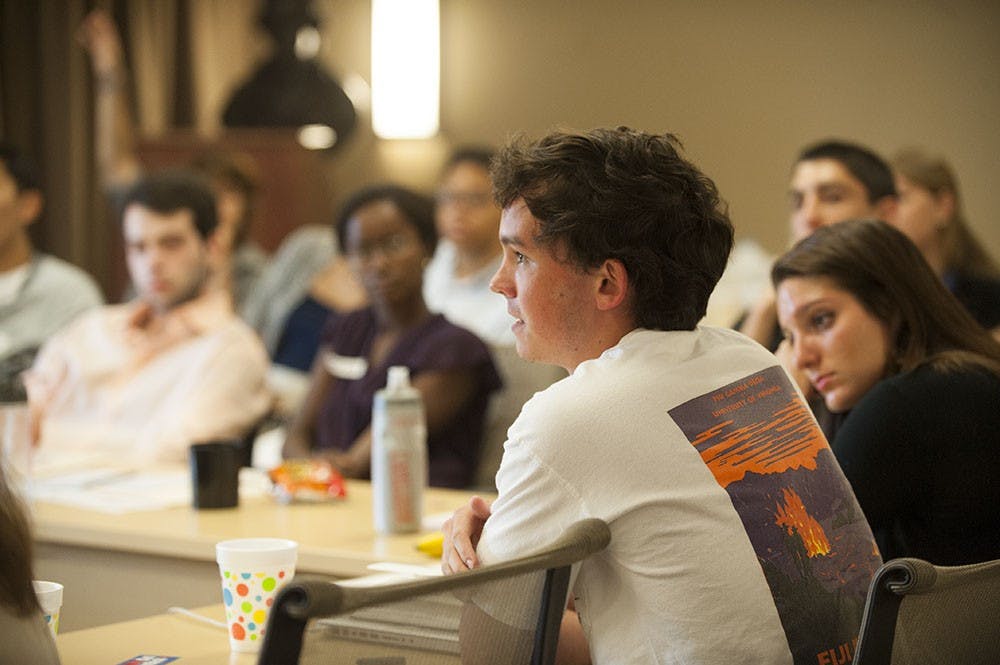Yesterday afternoon, the Sexual Assault Leadership Council hosted a summit to congregate student leaders and a “small representation of community stakeholders” to discuss sexual assault prevention at the University and how peer educators could address the University student body more broadly.
Organizations represented included the Honor Committee, One in Four, One Less, the Inter-Sorority Council, the Inter-Fraternity Council, the Women’s Center, Black Student Alliance and Student Council, among others.
According to Sara Surface, a third-year College student and external chair of the SALC, said the summit was “especially important in order to discuss how language is used to expand the communication of sexual misconduct between other organizations and most importantly other students.”
To effectively prevent sexual misconduct and educate students about the issue, the attendees of the summit agreed that it is vital to get students openly talking about the role sexual misconduct plays in University culture in addition to expanding student training in bystander intervention.
Surface said that it was important that students organizations start addressing the issue head on, citing the potential of the newly launched “Hoos Got Your Back” campaign, which is designed to get students “excited about [preventing sexual misconduct] and acknowledge their commitment and responsibility to this issue.”
Some representatives expressed that they saw the majority of conversation on Grounds surrounding sexual misconduct and bystander prevention as concentrated in the Greek community. The summit sought to find ways to increase the accessibility of resources about sexual misconduct for students who are not in fraternities or sororities, or in various advocacy organizations.
“I think that it will be important to create a conversation about this between the CIO’s and the minority-run student organizations around Grounds,” said Shanice Hardy, a fourth-year Batten student and vice president of the Black Student Alliance. “A lot of the times the presentations that are shown to [the fraternities and sororities of the National Panhellenic Council] aren’t tailored to how black students are affected by sexual misconduct.”
The general consensus was that specific groups throughout Grounds, such as One in Four and One Less — which respectively are the all-male and all-female sexual assault and peer education groups — have large presences within certain organizations such as the IFC and the ISC, but that they need to better impact the entire student body. SALC representatives highlighted that the student-run organizations need to construct a central body that increases communication between all groups and bridges the gap between their goals.
“One of our huge initiative this year is to build outreach to all student groups, to make sure we’re not hitting the same old groups,” Surface said. “Of course sororities and fraternities have a big stake in this issue, but so do many other CIO’s around Grounds and we need to start a conversation to work together.”
A majority of the advocacy-group representatives agreed that although the formal presentations some organizations use to communicate with students are effective in accumulating awareness, making the presentations informal would allow for attendees to voice their opinion and create dialogue.
Partnership with administration was also viewed positively and several participants praised Teresa Sullivan’s recent email that was distributed to all students and faculty calling for new sexual misconduct policies.
Sullivan introduced the “Not On Our Grounds” campaign in the email, which encourages zero tolerance for sexual violence and assault and has gained popularity through social media and has been included in first-year discussions during “Welcome Week.”
Some of the conversation focused on how the phrase “community of trust” could be utilized in relation to prevention of sexual assault. However, some student leaders showed reservations about the use of the phrase due to its association with the Honor Committee and Honor offenses rather than explicitly noting opposition to sexual misconduct.
There was also discussion of how “community of trust” could imply exclusion rather than inclusion of representatives of the University because the phrase was historically used in the context of whiteness and straightness at the University, which they said could have the unintended consequence of alienating sexual and racial minorities.







